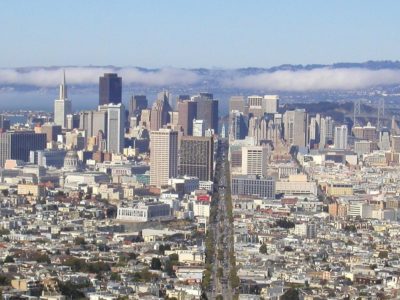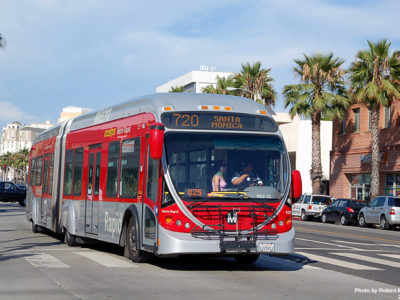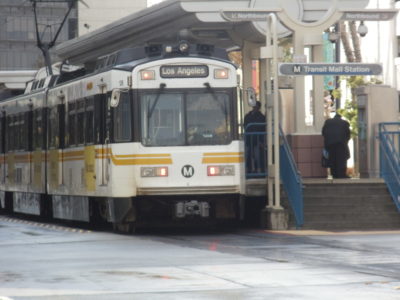public transportation
Transit-Oriented Development Shouldn’t Be A Coronavirus Casualty
California still needs more housing close to transit.
In recent weeks, California has emerged as one center of the COVID-19 pandemic, but it continues to face challenges that existed long before the disease reached the state. Two serious ones: how California will meet its ever more stringent greenhouse gas emission reduction targets, and how the state will manage to provide affordable housing for …
Continue reading “Transit-Oriented Development Shouldn’t Be A Coronavirus Casualty”
CONTINUE READINGClosing Downtown Market Street to Cars Is a Step in the Right Direction
The San Francisco Municipal Transportation Agency voted yesterday to approve a plan banning private automobiles on the downtown stretch of Market Street east of 10th Street. This section, one of the city’s busiest, will only be accessible to Muni vehicles, taxis, bicycles, and pedestrians (cars will still be able to cross Market). Commercial loading will …
Continue reading “Closing Downtown Market Street to Cars Is a Step in the Right Direction”
CONTINUE READINGAre Buses the Silver Bullet to Reduce Declines in Transit Ridership?
Reversing plummeting transit ridership is key to counteracting rising VMT
In my first deep dive into strategies to reduce vehicle miles travelled (VMT), I’m looking at declining transit ridership using Los Angeles as a case study since its ridership numbers drive the overall statewide trends. Investing in public transit is one of the most time-tested strategies for reducing personal VMT, since every car-owner we can …
Continue reading “Are Buses the Silver Bullet to Reduce Declines in Transit Ridership?”
CONTINUE READINGNYC’s Cap on Uber and Lyft Is an Important Step for Cities
A temporary pause to identify regulatory solutions to social and environmental impacts
Last week, the New York City Council enacted a temporary cap on Uber, Lyft and other transportation network company (TNC) vehicles in the city, blocking the issuance of new vehicle licenses for a 12-month period while the city conducts a study to determine whether to enact long-term regulations limiting the number of TNC vehicles on …
Continue reading “NYC’s Cap on Uber and Lyft Is an Important Step for Cities”
CONTINUE READINGThe CEQA Exemption that Ate LA
A bold attempt to get a huge exemption from state’s marquee environmental law
The California Environmental Quality Act (CEQA) is a state law that requires full analysis, public disclosure, and where feasible, mitigation of environmental impacts from state and local government projects, including permits for private development. I’ve written before about the problematic nature of exempting specific projects from CEQA. In general, my concern is that once you …
Continue reading “The CEQA Exemption that Ate LA”
CONTINUE READINGDoes Light Rail Get People Out of Their Cars?
Hopeful Findings from a New Metro Survey
My nominee for Greatest Article Title Of All Time is Don Pickrell’s 1992 piece in the Journal of the American Planning Association. Pickrell argued that while planners and local governments poured money into light rail, it never got the hoped-for ridership. The title? “A Desire Named Streetcar.” Well, as it turns out now, Los Angeles …
Continue reading “Does Light Rail Get People Out of Their Cars?”
CONTINUE READINGDoes Public Transit Improve Air Quality?
Yihsu Chen and Alexander Whalley of UC Merced think they know. They have analyzed some useful data from the opening of Taipei’s new subway, in a recent article in the American Economic Journal: Economic Policy: The transportation sector is a major source of air pollution worldwide, yet little is known about the effects of transportation infrastructure …
Continue reading “Does Public Transit Improve Air Quality?”
CONTINUE READINGAttention, Norm Entrepreneurs! Time to Get on the Bus
I’ve been pushing this for nearly a decade now, and now it looks like it’s finally happening (no thanks to me): If Dora Chavez knew exactly when her bus would arrive she could hustle to make it on time, stroll easily to the stop, or call work to say she would be late. With a new …
Continue reading “Attention, Norm Entrepreneurs! Time to Get on the Bus”
CONTINUE READINGA Roadmap for Sustainable Consumption
Individual consumption – including household heating and cooling as well as non-business transportation – creates roughly one-third of U.S. energy use and carbon emissions. It would feasible to reduce these emissions by twenty percent in a decade: there is a lot of low-hanging fruit yet to be picked. A range of individual actions, while seemingly …
Continue reading “A Roadmap for Sustainable Consumption”
CONTINUE READINGToo Cool to Avoid Blogging — The Straddling Bus
Critics of subways often argue, correctly, that they are very, very expensive. They argue much less correctly that they aren’t worth it from a cost-benefit perspective. (I’ll believe when they add in the subsidies for roads and automobiles, price auto traffic like they do with rail, and stop using tendentious examples to criticize high-speed rail). …
Continue reading “Too Cool to Avoid Blogging — The Straddling Bus”
CONTINUE READING







